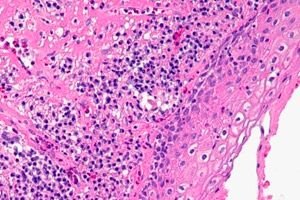
All iLive content is medically reviewed or fact checked to ensure as much factual accuracy as possible.
We have strict sourcing guidelines and only link to reputable media sites, academic research institutions and, whenever possible, medically peer reviewed studies. Note that the numbers in parentheses ([1], [2], etc.) are clickable links to these studies.
If you feel that any of our content is inaccurate, out-of-date, or otherwise questionable, please select it and press Ctrl + Enter.
Vulvitis
Medical expert of the article
Last reviewed: 04.07.2025

Vulvitis is an acute or chronic recurrent inflammation of the vulva.
It is not a disease, but refers to inflammation of the soft folds of skin on the outside of the female genitals, the vulva. The inflammation can be caused by infection, allergic reactions or trauma.
Causes vulvita
In women of reproductive age, vulvitis usually occurs as a result of infection of the external genitalia with pathogenic microorganisms contained in vaginal discharge during colpitis, cervicitis, endometritis. The secondary process often has the character of vulvovaginitis. There is also primary vulvitis, the occurrence of which is facilitated by diaper rash (with obesity), failure to observe hygiene of the external genitalia, chemical, thermal, mechanical (scratches, abrasions, etc.) effects, endocrine (diabetes, etc.) diseases, inflammatory processes in the perianal area.
In childhood and prepuberty, vulvitis is often primary. From the external genital area, the infection penetrates into the vagina, causing vulvovaginitis.
Risk factors
Conditions that contribute to the appearance and long-term course of vulvovaginitis in children are infectious-toxic processes that reduce the body's resistance. Vulvovaginitis is preceded or accompanied by general infectious diseases (measles, scarlet fever, mumps, chickenpox, etc.). Vulvovaginitis is especially often combined with exudative diathesis, tonsillitis, pyelonephritis.
Symptoms vulvita
Vulvitis in the acute stage is characterized by hyperemia and swelling of the external genitalia, the presence of serous-purulent plaque. Complaints of pain, burning, often general malaise. In the chronic stage - hyperemia, swelling, exudation decrease, itching subsides, but periodically resumes.
Where does it hurt?
What's bothering you?
What do need to examine?
What tests are needed?
Who to contact?
Treatment vulvita
Sitz baths with chamomile decoction or a weak solution of potassium permanganate, use of antibacterial drugs as indicated, internally and/or internally, treatment of concomitant genital and extragenital diseases.
Drugs


 [
[